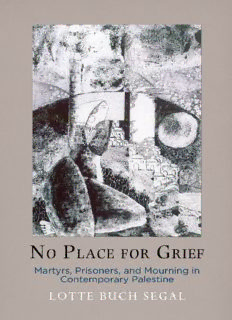
No Place for Grief: Martyrs, Prisoners, and Mourning in Contemporary Palestine PDF
Preview No Place for Grief: Martyrs, Prisoners, and Mourning in Contemporary Palestine
No Place for Grief THE ETHNOGRAPHY OF PO LITI CAL VIO LENCE Tobias Kelly, Series Editor A complete list of books in the series is available from the publisher. NO PLACE FOR GRIEF Martyrs, Prisoners, and Mourning in Con temporary Palestine Lotte Buch Segal UNIVERSITY OF PENNSYLVANIA PRESS PHILADELPHIA Copyright © 2016 University of Pennsylvania Press All rights reserved. Except for brief quotations used for purposes of review or scholarly citation, none of this book may be reproduced in any form by any means without written permission from the publisher. Published by University of Pennsylvania Press Philadelphia, Pennsylvania 19104-4112 www . upenn . edu / pennpress Printed in the United States of Amer i ca on acid- free paper 1 3 5 7 9 10 8 6 4 2 A catalogue record for this book is available from the Library of Congress. ISBN 978-0-8122-4821-0 For Sune, David, and Elias This page intentionally left blank CONTENTS Preface ix Note on Transliteration x Introduction 1 Chapter 1. Th e Grammar of Suff ering in Occupied Palestine 26 Chapter 2. Domestic Uncanniness 48 Chapter 3. Enduring Pres ents 81 Chapter 4. On Hardship and Closeness 99 Chapter 5. Solitude in Marriage 124 Chapter 6. Enduring the Ordinary 143 Conclusion 167 Notes 177 References 183 Index 197 Acknowl edgments 207 This page intentionally left blank PREFACE My time in Palestine has left me with a sadness that fl ows from the experi- ences of the people I encountered there. Th e question of whether this infl u- ences my interpretation of words, human beings, and situations is at best rhetorical. Many times I did not know how to respond to the words, tears, or gestures of the human beings at the heart of this book. How could I reply? As a female researcher from one of the most affl uent socie ties of the world. As a woman whose life is not imperiled by the systematic exhaustion of the Palestinian occupation. As someone who feels empathy with the people she meets without certainty that empathy is ever exhaustive or necessarily the pathway to knowledge. A student in my Psy chol ogy in Anthropology course asked me aft er hav- ing read Chapter 2 of this book for class: “Do you understand these women?” To this question I replied with a qualifi ed “Yes.” It is a yes only if we mean knowledge in the sense of ac know ledg ment, which I off er here. I have done my best not to simplify these women’s experiences, but I also know that I could not entirely avoid it. I feel compelled to act upon what I know, but I am not sure of the conse- quences. I write. I tell. Who listens? Some do. Does it matter? I do not know. João Biehl once asked me what I thought was the most power ful part of my work. It took me an hour to dare to say that it may have been sitting down and listening to those women, so at least they knew that I had heard their stories. Th ey knew, and I knew. Now you know.
Description: